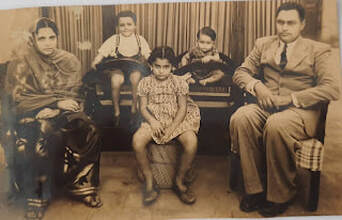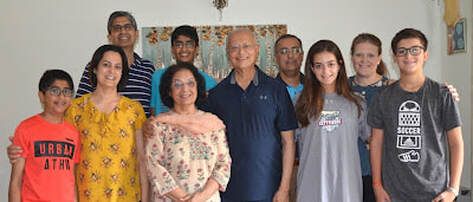
With his father’s job as a Judge, the family lived in the designated Judge’s residences, which was an independent bungalow on a small hilltop
Partition Stories from the Province of Sindh
Subash Bijlani was born on 6th September 1942 in Thatta, Sindh (Now in Pakistan) to parents Khanchand and Jassie.
Following Partition, Subash says his family was fortunate as they were in relative safety up to the time they left, aided by the Muslim community.
These days, Subash divides his times between the state of Maryland in the United States of America and Gurgaon, Haryana, India and this is his story.
Subash Bijlani is one of seven siblings – three brothers and four sisters. His father, Khanchand, was a Sessions Judge in Sukkur and his mother, Jassie, a homemaker.
With his father’s job as a Judge, the family lived in the designated Judge’s residences, which was an independent bungalow on a small hilltop – an environment that undoubtedly is one of the reasons that Subash describes life in Thatta as peaceful. Due to the location of the residence, the family did not have any immediate neighbors but had a number of friends and Subash recalls a childhood that was relaxing and full of fun.
On the day the family left Sindh, armed guards from the Sukkur court, all of whom were Muslims, escorted the family on the train journey to cross the border
Subash was five years old and studying in kindergarten when Partition happened. Yet, the family did not leave until January 1948 – but they were not the only ones to stay on. Subash shared that there were many like his family who did not leave immediately as they believed that the communal disturbances and violence were short-lived and would die down. Yet others, like his father, believed that professionals, such as the judiciary, would of course still be needed in this newly created nation, and that there would be a place for the family to stay on.

Despite his young age, he vividly recalls what happened on the day the family had to leave their hometown, supplemented over the years from what he heard from his parents as he was growing up.
On the day the family left Sindh, armed guards from the Sukkur court, all of whom were Muslims, escorted the family on the train journey to cross the border. “Our family was clearly fortunate,” says Subash. “We were not only safe; the bonds were on display when the Muslim policemen bade us a tearful farewell and pleaded us to stay back.”
The family’s destination was Bombay (today known as Mumbai), where they had relatives.
Not till he became a parent did Subash begin to understand and appreciate the enormity of the challenge that his parents must have faced to not only pack up their lives but to make that journey with small children.
Looking back at his family’s experience of being kept safe, he says that his is not an isolated experience. Over the years, he has heard stories from family friends of the warmth and co-operation of their Sindhi Muslim neighbors and friends, who provided them protection and escorted them safely to the local railway stations or to the harbor in Karachi.
Today, Subash, who has two children, is a Professor at the University of Maryland Global Campus and divides his time between Maryland and Haryana, India.
___________________
Courtesy: Stories of Sindh (Posted on September 29, 2021)